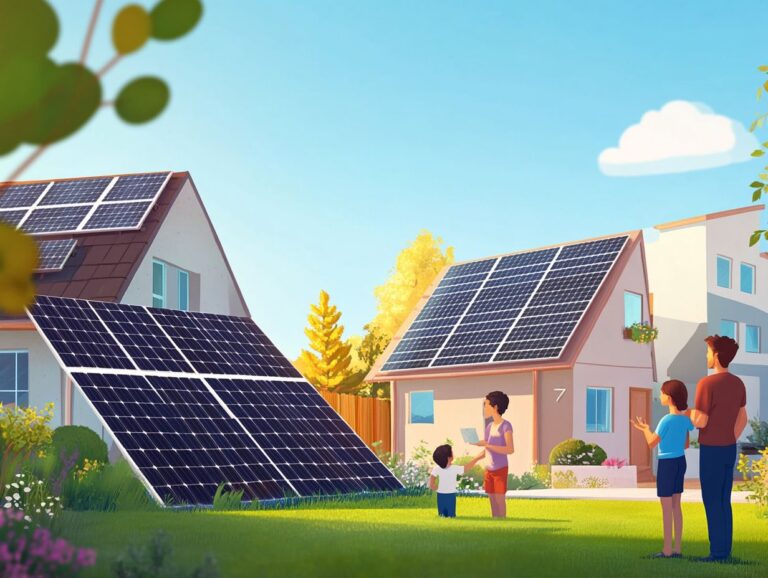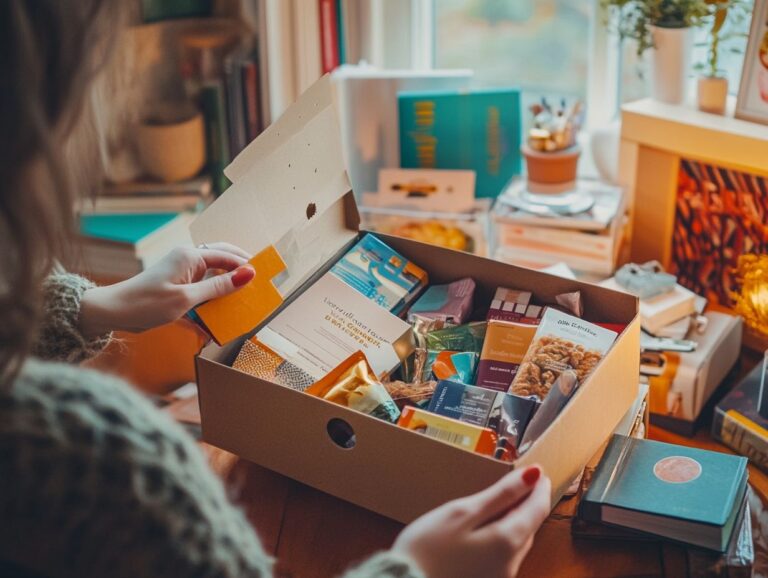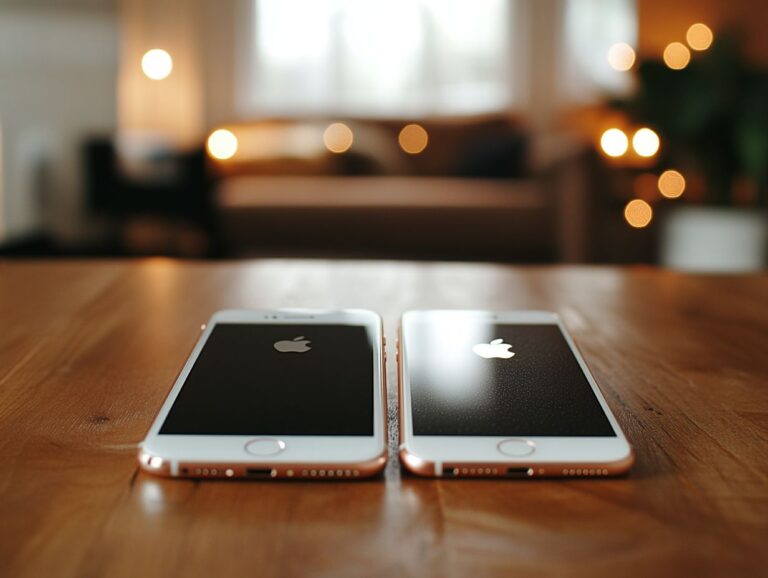Minimalism: Does It Really Make Life Better?
In a world often flooded with excess, minimalism offers you a refreshing approach to living with intention and purpose.
This article dives into the essence of minimalism, breaking down its core principles and the many benefits it can bring to your life. It also tackles common challenges and misconceptions about this lifestyle, and provides practical tips for weaving minimalism into your daily routine.
You’ll discover the profound connections between minimalism, mental health, and sustainability, showing how this philosophy can help you lead a more fulfilling and environmentally conscious life. Embracing minimalism might just be the key to unlocking a better life for yourself.
Understanding Minimalism
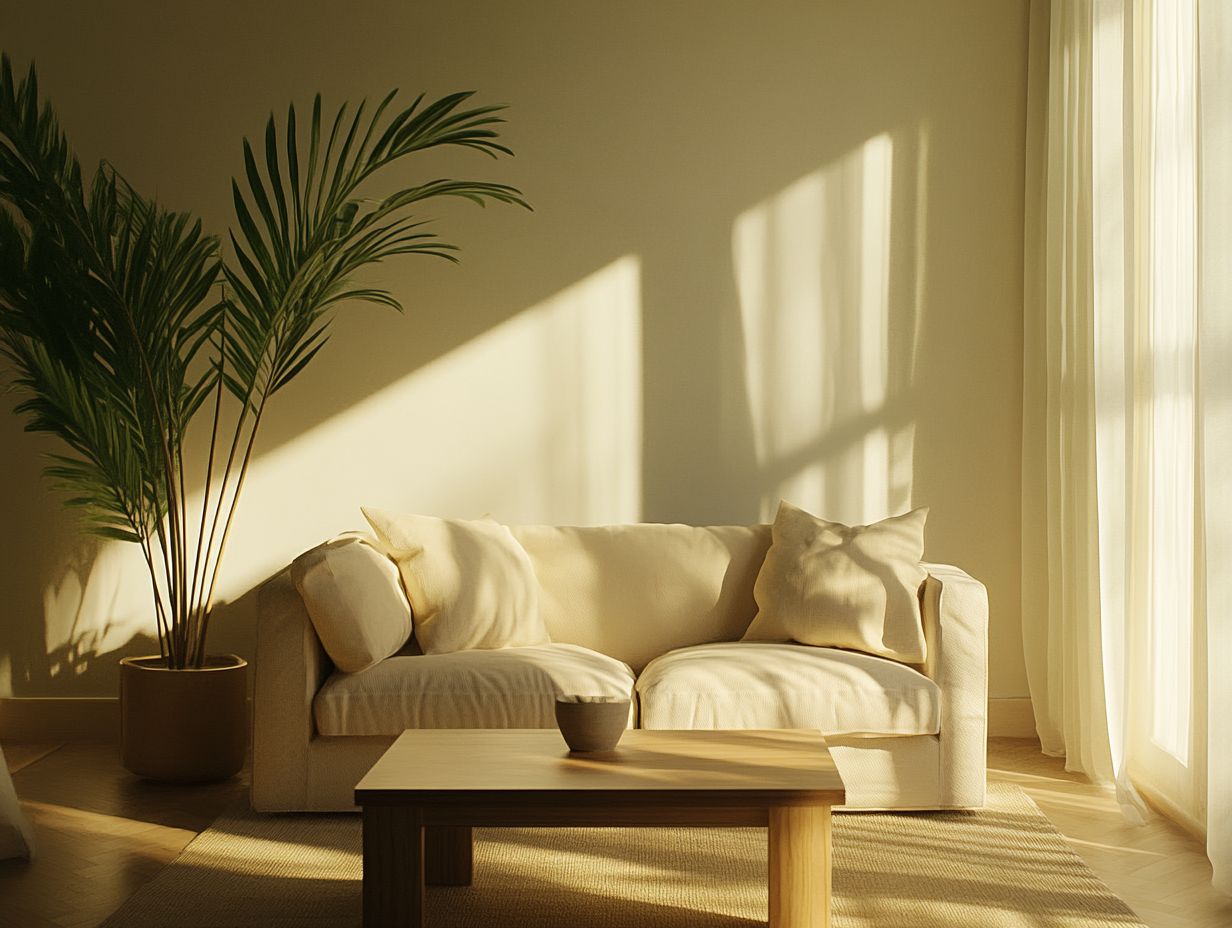
Understanding minimalism means diving into a lifestyle that really emphasizes simplicity and intentional choices. It’s about decluttering not just your physical space, but also your mind.
At its core, minimalism encourages you to be mindful and focus on experiences rather than possessions, which can lead to a life filled with happiness, emotional well-being, and fulfillment.
When you adopt a minimalistic mindset, you start prioritizing your values and life goals, which helps you grow personally and frees you from the weight of consumerism and materialism.
Defining Minimalism and Its Principles
Defining minimalism starts with grasping its core principles, which center around essentialism and living with less to create a more meaningful life. This philosophy encourages you to declutter both your physical possessions and mental distractions, letting you focus more clearly on what truly matters to you.
By embracing minimalistic design and intentional living, you can cultivate a space that reflects your personal values and helps reduce emotional attachment to material items. This ultimately fosters a sense of inner peace and clarity.
The principles of minimalism push you to seek only what is essential, leading to some profound emotional and psychological shifts. Aesthetics play a big role in this practice, as they encourage you to appreciate the simplicity and beauty found in functionality.
By prioritizing experiences and relationships over physical belongings, you can navigate the sometimes tricky journey of letting go. Overcoming emotional attachments to things not only clears your living space but also boosts your personal growth.
This journey offers you deeper self-discovery and improved well-being, as you learn to cherish fleeting moments and cultivate gratitude for life’s simplest pleasures.
The Benefits of Minimalism
The benefits of minimalism are plentiful, giving you a clear path to reduce stress, boost mental clarity, and enhance your overall happiness—all while leading you to a more productive and fulfilling lifestyle.
By embracing minimalism, you can enjoy significant financial savings and sharpen your organizational skills, letting you focus on what truly matters in your life.
This shift towards a minimalist approach helps you prioritize relationships and self-care, bringing a sense of joy and balance that often gets lost in the chaos of consumerism.
How Minimalism Can Improve Your Life

Minimalism can really transform your life by encouraging you to live intentionally and creating a clutter-free space that boosts your overall well-being. When you focus on optimizing your space and ditching unnecessary distractions, you craft a sanctuary for creativity and peace. This allows you to hone in on your life goals and personal growth.
It’s a shift that promotes a more sustainable and fulfilling lifestyle, where experiences take precedence over possessions, ultimately leading to greater happiness and a sense of freedom.
For example, many people find that adopting a minimalist approach streamlines their daily routines. You end up spending less time managing your stuff and more time engaged in activities that truly matter. A study from the Journal of Consumer Research even found that minimalism can significantly lower stress levels because you no longer feel buried under physical clutter or the pressure to acquire more.
You’ll hear personal accounts of the emotional freedom that comes after decluttering. People often report a newfound clarity and the ability to focus on relationships or personal passions that had previously taken a backseat.
So, embracing minimalism not only helps you create a peaceful home environment but also enables you to reclaim your time and improve your emotional health.
Challenges and Misconceptions of Minimalism
Even with all its perks, the minimalism movement comes with its fair share of misconceptions and challenges that might hold you back from diving into a minimalistic lifestyle.
A lot of folks wrongly think minimalism means deprivation or living in extreme conditions, which can make them anxious about losing their emotional attachment to their stuff.
But here’s the truth: minimalism is really about making intentional choices that enrich your life. It’s all about connecting more deeply with what you truly value, not just cutting down on clutter for the sake of it.
Common Obstacles and Misunderstandings
Common obstacles and misunderstandings about minimalism can really throw a wrench in your plans to embrace a lifestyle of living with less. You might find yourself struggling with emotional attachments to your possessions, worrying that minimalism means living a frugal life that limits your joy and fulfillment.
But grasping these misconceptions can help you navigate those challenges and realize that minimalism is really about making intentional choices that bring happiness and purpose to your life, not just cutting back on stuff.
For example, that fear of losing cherished memories tied to physical items often comes from misunderstanding what minimalism is really all about. It’s not about tossing everything out; it’s about figuring out which items genuinely enrich your life and letting go of the ones that don’t.
By changing the way you think about minimalism, you can focus on enhancing your living space in a way that brings clarity and enablement.
This journey encourages you to reflect on yourself, helping you distinguish between needs and wants, and ultimately cultivating a lifestyle that prioritizes meaningful experiences and genuine connections over material wealth.
Incorporating Minimalism into Your Life
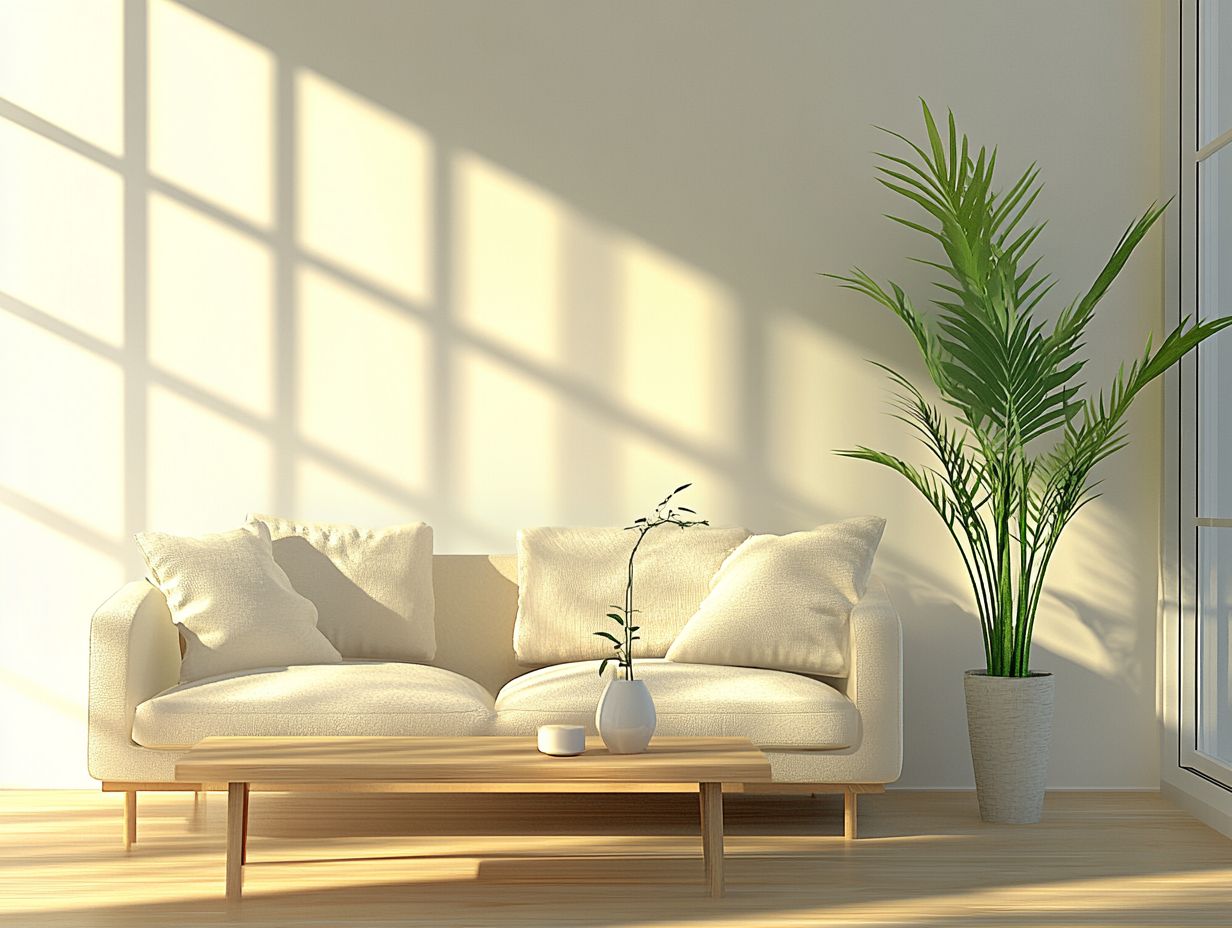
Incorporating minimalism into your life can truly be a game changer, and there are plenty of practical tips and strategies to help you on this journey toward a simpler, more intentional lifestyle.
Start by decluttering your space and honing your organization skills to boost your mental clarity and free yourself from those overwhelming distractions.
Taking a gradual approach will allow you to embrace a minimalistic mindset that not only enhances your emotional well-being but also fosters personal growth, leading you to a more fulfilling and balanced life.
Practical Tips and Strategies
Here are some practical tips and strategies to help you embrace minimalism in your daily life, creating a decluttered mind and encouraging mindfulness in your actions.
Start by taking a good look at your possessions and figuring out what really adds value to your life. This way, you can enjoy the freedom of letting go of unnecessary items and prioritize experiences over things. Not only does this simplify your space, but it also boosts your emotional well-being and overall happiness.
Begin with a room or area that feels a bit overwhelming. Go through your items and ask yourself if each one serves a purpose or brings you joy.
Next, categorize your belongings into three piles: keep, donate, and discard. Make those decisions with intention! Then, think about streamlining your daily routines by setting specific times for tasks. This can help you cut down on decision fatigue.
Practicing mindfulness in your choices can lead to thoughtful shopping habits and a more intentional way of living. For instance, dedicating a weekend to decluttering can give you some clarity, and learning to savor moments instead of accumulating more stuff can help you uncover personal growth through minimalism.
Minimalism and Mental Health
The intersection of minimalism and mental health shows some pretty amazing benefits. When you adopt a minimalist lifestyle, it can seriously boost your emotional well-being and help reduce anxiety and stress.
By decluttering your space and simplifying your commitments, you create room for mental clarity and self-reflection. This allows you to nurture relationships and focus on what really matters to you. This holistic approach can bring a sense of balance and enable you to pursue a more meaningful life.
The Connection Between Minimalism and Well-Being
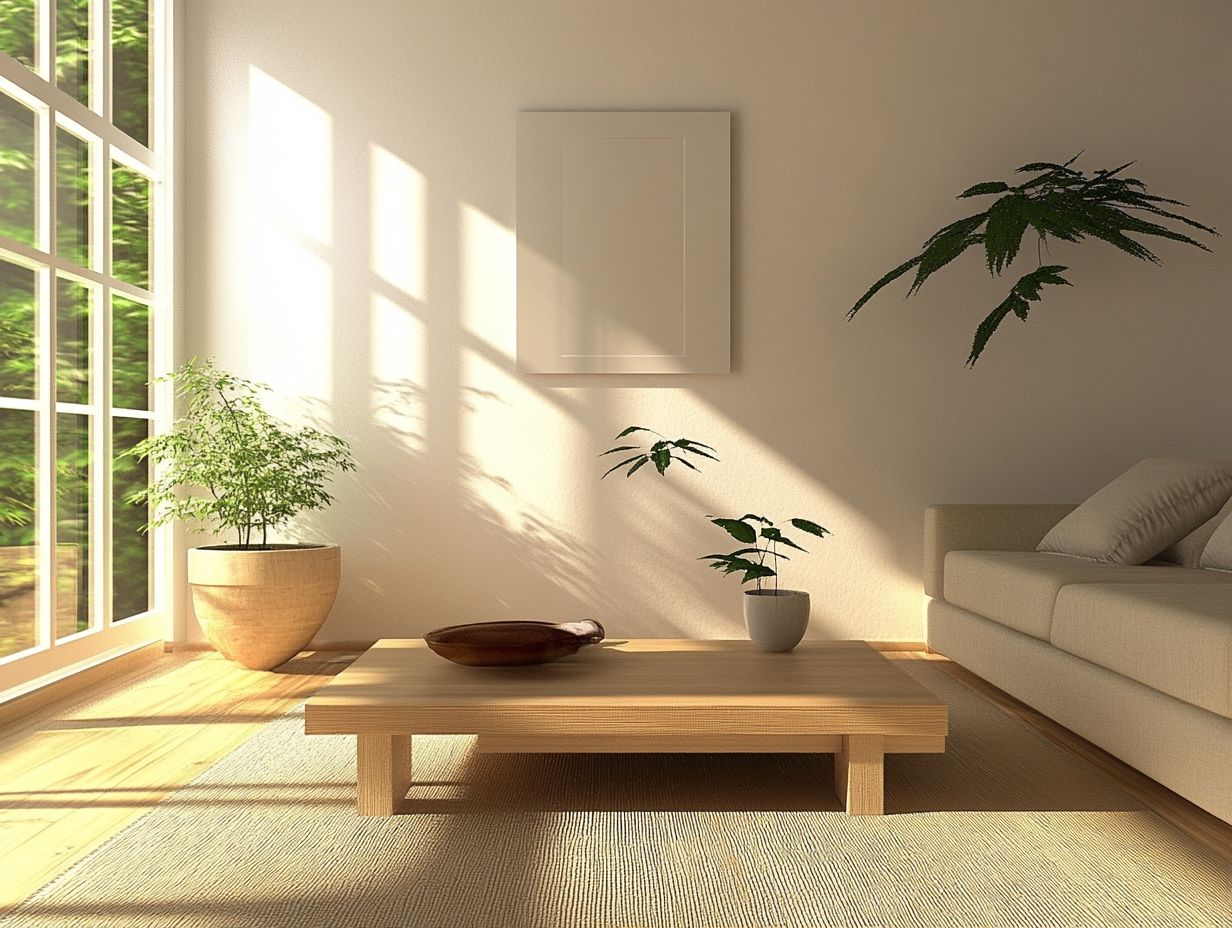
There’s a deep connection between minimalism and your well-being. Embracing this lifestyle can really boost your mental health and enhance your mindfulness in daily life.
By consciously choosing to eliminate distractions and simplify your surroundings, you’re paving the way for emotional freedom and fulfillment, both of which are essential for holistic well-being. This connection enables you to prioritize your mental health and use the benefits of minimalism to create a more balanced and joyful life.
When you embrace minimalism, you might start feeling lighter, both physically and emotionally. This lifestyle encourages you to take a step back and really focus on what matters most, helping you cultivate deeper connections in your relationships.
By shedding material clutter, you also clear up mental space, making way for creativity and personal growth. This clarity can lead to a greater sense of purpose as you align your actions with your core values, ultimately nurturing a more fulfilling existence.
In the end, your journey toward minimalism doesn’t just enhance mindfulness; it can also be a powerful tool for building emotional resilience and forming authentic connections with yourself and others.
Minimalism and Sustainability
Minimalism and sustainability really go hand in hand. When you embrace a minimalistic lifestyle, you’re promoting ethical consumption and cutting down on your environmental impact through intentional choices and sustainable practices.
By choosing to live with less, you’re not just decluttering your life; you’re also doing your part for a healthier planet. This mindset helps you recognize the importance of sustainability within the minimalism movement, inspiring you to make thoughtful decisions that reflect your personal values and contribute to global well-being.
The Environmental Impact of Minimalism
The environmental impact of minimalism is pretty profound. Living a clutter-free life encourages you to embrace sustainable living and make ethical choices that benefit both yourself and the planet.
When you reduce your material possessions, you’re not just cutting back on waste; you’re making conscious decisions that help minimize your ecological footprint. It’s a powerful reminder that sometimes, less really is more. By aligning minimalism with environmental awareness, you can create a lifestyle that supports your well-being while also being kind to the Earth.
Did you know that the average American generates about 4.4 pounds of waste every single day? That’s a staggering figure, and minimalism takes a direct swing at it. By embracing fewer items, you can significantly cut down your waste production, which contributes to less landfill overflow and lowers the carbon emissions tied to manufacturing and transporting goods.
Take it from a case study that showed families adopting minimalism managed to shrink their waste footprint by nearly 50% in just a year. With fewer resources consumed, you help lighten the load on our planet’s limited assets, leading to better resource conservation and less exploitation of natural ecosystems.


